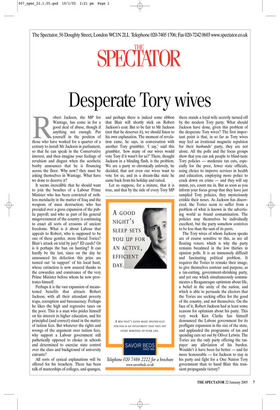Desperate Tory wives
Robert Jackson, the MP for Wantage, has come in for a good deal of abuse, though if anything not enough. Put yourself in the position of those who have worked for a quarter of a century to install Mr Jackson in parliament, so that he can speak in the Conservative interest, and then imagine your feelings of revulsion and disgust when the aesthetic booby announces that he is flouncing across the floor. Why now? they must be asking themselves in Wantage. What have we done to deserve it?
It seems incredible that he should want to join the benches of a Labour Prime Minister who has been convicted of ruthless mendacity in the matter of Iraq and the weapons of mass destruction; who has presided over a gross expansion of the public payroll; and who as part of his general misgovernment of the country is continuing to enact all sorts of erosions of ancient freedoms. What is it about Labour that appeals to Robert, who is supposed to be one of these gentler, more liberal Tories? Blair’s attack on trial by jury? ID cards? Or is it perhaps the ban on hunting? It can hardly be the last, since on the day he announced his defection this prize ass turned out ‘in support’ of his local hunt, whose extinction is now assured thanks to the cowardice and connivance of the very Prime Minister before whom he now prostrates himself.
Perhaps it is the vast expansion of meanstested benefits that attracts Robert Jackson, with all their attendant poverty traps, corruption and bureaucracy. Perhaps he likes the high and regressive taxes on the poor. This is a man who prides himself on his interest in higher education, and his principled (and correct) stand in the matter of tuition fees. But whatever the rights and wrongs of the argument over tuition fees, why support a Labour government still pathetically opposed to choice in schools and determined to exercise state control over the class and background of university entrants?
All sorts of cynical explanations will be offered for his treachery. There has been talk of masterships of colleges, and quangos, and perhaps there is indeed some ribbon that Blair will shortly stick on Robert Jackson’s coat. But to be fair to Mr Jackson (not that he deserves it), we should listen to his own explanation. The moment of revelation came, he says, in conversation with another Tory grumbler. ‘I say,’ said this grumbler, ‘how many of our wives would vote Tory if it wasn’t for us?’ There, thought Jackson in a blinding flash, is the problem. We are a party so chronically unlovely, he decided, that not even our wives want to vote for us, and in a dream-like state he came back from his holiday and ratted.
Let us suppose, for a minute, that it is true, and that by the side of every Tory MP there stands a loyal wife secretly turned off by the modern Tory party. What should Jackson have done, given this problem of the desperate Tory wives? The first important point is that, in so far as Tory wives may feel an irrational magnetic repulsion for their husbands’ party, they are not alone. All the polls and the focus groups show that you can ask people to blind-taste Tory policies — moderate tax cuts, especially for the poor, fewer state officials, using choice to improve services in health and education, employing more police to crack down on crime — and they will say mmm, yes, count me in. But as soon as you inform your focus group that they have just sampled Tory policies, they mysteriously crinkle their noses. As Jackson has discovered, the Tories seem to suffer from a problem of what is known in the advertising world as brand contamination. The policies may themselves be individually excellent, but the party somehow contrives to be less than the sum of its parts.
The Tory wives of whom Jackson speaks are of course sensitive to this, as are all floating voters; which is why the party remains becalmed in the low thirties in opinion polls. It is an immensely difficult and fascinating political problem. It requires the Tories to remake their image, to give themselves contour and purpose, as a tax-cutting, government-shrinking party, and yet one which simultaneously communicates a Reaganesque optimism about life, a belief in the unity of the nation, and which is able to persuade the electors that the Tories are seeking office for the good of the country, and not themselves. On the face of it, Robert Jackson had at least some reasons for optimism about his party. This very week Ken Clarke has himself denounced the Labour government for its profligate expansion in the size of the state, and applauded the programme of tax and spending cuts set out by Oliver Letwin. The Tories are the only party offering the taxpayer any alleviation of his burden. Wouldn’t it have been far better — and far more honourable — for Jackson to stay in his party and fight for a One Nation Tory government than to hand Blair this transient propaganda victory?













































 Previous page
Previous page